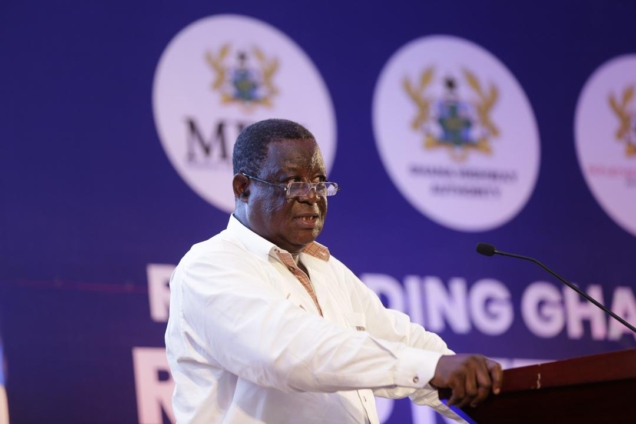The Roads and Highways Minister, Kwasi Amoako-Attah is seeking the support of road contractors across the country for the passage of the controversial Electronic Transaction Levy (E-levy) Bill.
According to him, the passage of the Bill will allow the government to generate revenue to settle the outstanding debts owed road contractors within the shortest possible time.
Speaking at a meeting with the leadership of the Road Contactors Association, the Minister urged the road contractors to support the introduction of the levy to enable the government improve roads in the country.
“If e-levy comes, we get our fair share into the road sector. Within a very short time, all outstanding contractors' debt will be paid and you can work more for this country. We expect you to speak, you are going to be the direct beneficiaries of this levy and every serious government will not joke with contractors,” he said.
He added that, “we are bringing a levy that will help to build a fund to support infrastructure generally, especially road infrastructure.”
As the Roads and Highways Minister, Mr. Amoako-Attah has been advocating the passage of the Bill strongly. On February 3, 2022, he called on Ghanaians and Members of Parliament in the Northern Region to support the passage of the Electronic Transaction Levy (E-levy) Bill.
“So the people of this county and the people of Tamale, All MPs in Tamale you must support the passage of the E-levy Bill for more to be done for them and their constituencies,” he appealed.
About E-levy
Finance Minister Ken Ofori-Atta, presenting the 2022 budget on Wednesday, November 17, announced that the government intends to introduce an Electronic Transaction Levy (e-levy).
The levy, he revealed, is being introduced to “widen the tax net and rope in the informal sector”. This followed a previous announcement that the government intends to halt the collection of road tolls.
The proposed levy, which was expected to come into effect in January, 2022, is a charge of 1.75% on the value of electronic transactions. It covers mobile money payments, bank transfers, merchant payments, and inward remittances. There is an exemption for transactions up to GH¢100 per day.
Explaining the government’s decision, the Finance Minister revealed that the total digital transactions for 2020 were estimated to be over GH¢500 billion (about $81 billion) compared to GH¢78 billion ($12.5 billion) in 2016. Thus, the need to widen the tax net to include the informal sector.
Although the government has argued that it is an innovative way to generate revenue, scores of citizens and stakeholders expressed varied sentiments on its appropriateness with many standing firmly against it.
Even though others have argued in support of the levy, a section of the populace believes that the 1.75% e-levy is an insensitive tax policy that will deepen the already prevailing hardship in the country.
Latest Stories
-
Women’s participation key to economic growth –Yaw Njorgnab
7 minutes -
Parliament passes bill to abolish E-Levy; President Mahama’s assent expected
24 minutes -
NDC members involved in galamsey must be brought to book – Benjamin Quashie
31 minutes -
Starting a business in Ghana still difficult – World Bank’s B-Ready 2024 report reveals
36 minutes -
Kumerica is not just about hip hop – Tony Dath
37 minutes -
At least 24 dead in South Korea’s ‘worst ever fires’
48 minutes -
Dead body found in sack by roadside in Enchi
49 minutes -
Stephen Amoah, Bryan Acheampong back repeal of E-Levy
54 minutes -
NPP can’t lecture gov’t on handling of petitions for CJ’s removal – Felix Kwakye Ofosu
1 hour -
CIHRM pays courtesy call on new Labour Minister
1 hour -
King Paluta is next TGMA Artiste of the Year – Tony Dath
1 hour -
GMA warns of thunderstorms in Accra, Ho and Northern Region
1 hour -
Homowo Festival: Ga State announces ban on drumming and noise-making from May 12
1 hour -
HCOWA partners Global Tech Leaders to revolutionise AI medical imaging in Ghana, West Africa
1 hour -
NGO engages herbal medicine producers under its biodiversity project
1 hour

